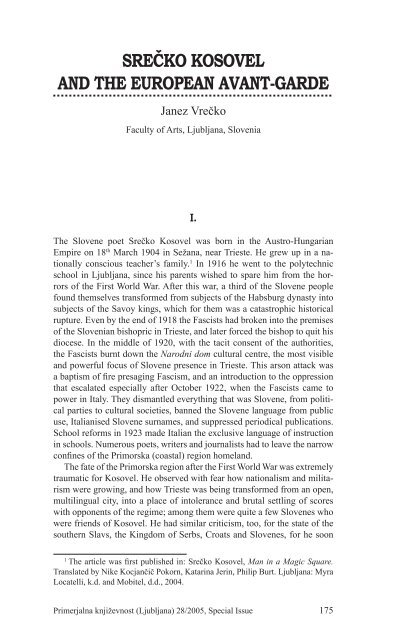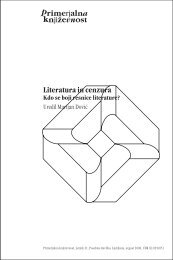- Page 3 and 4:
Ljubljana 2005 ● Posebna števil
- Page 5:
Avgust Černigoj: Srečko Kosovel (
- Page 8 and 9:
VSEBINBoris A. Novak:kosovel, velik
- Page 10 and 11:
niških parazvrsti sledijo prispevk
- Page 12 and 13:
KOSOVELOVA POETIKASredi dehtečih b
- Page 14 and 15:
KOSOVELOVA POETIKADaj mi, Bog, da m
- Page 16 and 17:
KOSOVELOVA POETIKAneoporečen, si K
- Page 18 and 19:
KOSOVELOVA POETIKAKadar bolna duša
- Page 20 and 21:
KOSOVELOVA POETIKAje pri vprašanji
- Page 23 and 24:
KOSOVEL IN MODERNA POEZIJA:ANALIZA
- Page 25 and 26:
DARJA PAVLIČ: KOSOVEL IN MODERNA P
- Page 27 and 28:
DARJA PAVLIČ: KOSOVEL IN MODERNA P
- Page 29 and 30:
DARJA PAVLIČ: KOSOVEL IN MODERNA P
- Page 31 and 32:
DARJA PAVLIČ: KOSOVEL IN MODERNA P
- Page 33 and 34:
DARJA PAVLIČ: KOSOVEL IN MODERNA P
- Page 35 and 36:
DARJA PAVLIČ: KOSOVEL IN MODERNA P
- Page 37 and 38:
DARJA PAVLIČ: KOSOVEL IN MODERNA P
- Page 39 and 40:
Ideja integralovv Kosovelovi poezij
- Page 41 and 42:
Bożena Tokarz: Ideja integralov v
- Page 43 and 44:
Bożena Tokarz: Ideja integralov v
- Page 45 and 46:
tost besedne umetnosti. Ko je opazi
- Page 47:
Bożena Tokarz: Ideja integralov v
- Page 50 and 51:
KOSOVELOVA POETIKAdodeljena štipen
- Page 52 and 53:
KOSOVELOVA POETIKAki ji bo pripadal
- Page 54 and 55:
KOSOVELOVA POETIKAZa LCK je bil zna
- Page 56 and 57:
KOSOVELOVA POETIKAv katerem sta bil
- Page 58 and 59:
KOSOVELOVA POETIKAČe k temu dodamo
- Page 60 and 61:
KOSOVEL’s poeticsznamenitih konso
- Page 62 and 63:
KOSOVELOVA POETIKAsam uspel spravit
- Page 64 and 65:
KOSOVELOVA POETIKAkaže njegovo pre
- Page 66 and 67:
KOSOVELOVA POETIKAsama na sebi prob
- Page 68 and 69:
KOSOVELOVA POETIKAdestrukcije vseh
- Page 70 and 71:
KOSOVELOVA POETIKAra - ta je lahko
- Page 72 and 73:
KOSOVELOVA POETIKA6To se, resnici n
- Page 74 and 75:
KOSOVELOVA POETIKAAnton OCVIRK, 194
- Page 77 and 78:
Kanonizacija»odsotnega« avtorjaMa
- Page 79 and 80:
Marijan Dović: Kanonizacija »odso
- Page 81 and 82:
Marijan Dović: Kanonizacija »odso
- Page 83 and 84:
Marijan Dović: Kanonizacija »odso
- Page 85 and 86:
KOSOVEL IN NIHILIZEM:POSKUSKONSTRUK
- Page 87 and 88:
MATEVŽ KOS: KOSOVEL IN NIHILIZEM:
- Page 89 and 90:
MATEVŽ KOS: KOSOVEL IN NIHILIZEM:
- Page 91 and 92:
MATEVŽ KOS: KOSOVEL IN NIHILIZEM:
- Page 93:
MATEVŽ KOS: KOSOVEL IN NIHILIZEM:
- Page 96 and 97:
KOSOVELOVA POETIKAgovoriti obširno
- Page 98 and 99:
KOSOVELOVA POETIKA1993). Italijansk
- Page 100 and 101:
KOSOVELOVA POETIKAZlati čoln v mo
- Page 102 and 103:
KOSOVELOVA POETIKAdružbi, vendar s
- Page 104 and 105:
KOSOVELOVA POETIKABIBLIOGRAFIJAADOR
- Page 106 and 107:
KOSOVELOVA POETIKA• POVZETEKUDK 8
- Page 108 and 109:
KOSOVELOVA POETIKAFirencah, pridru
- Page 110 and 111:
KOSOVELOVA POETIKAnjegovi poetiki n
- Page 112 and 113:
KOSOVELOVA POETIKAumnih, z italiani
- Page 114 and 115:
KOSOVELOVA POETIKAOPOMBE1 Prim. E.
- Page 116 and 117:
KOSOVELOVA POETIKA20 Cit. v: B. Pah
- Page 118 and 119:
KOSOVELOVA POETIKAbili blizu. Podob
- Page 120 and 121:
KOSOVELOVA POETIKAKot je Kosovel ne
- Page 122 and 123:
KOSOVELOVA POETIKAselekciji gradiva
- Page 124 and 125:
KOSOVELOVA POETIKAtudi naslov druge
- Page 126 and 127:
KOSOVELOVA POETIKA4C. Rebora, Framm
- Page 128 and 129: KOSOVELOVA POETIKA50Idem, str. 193.
- Page 130 and 131: SODCIDarja Betocchi poučuje italij
- Page 132 and 133: poetike. Napisala je več kot 100 r
- Page 134 and 135: ContentsBoris A. Novak:kosovel, a g
- Page 136 and 137: es are followed by papers discussin
- Page 138 and 139: KOSOVEL’s poeticsSredi dehtečih
- Page 140 and 141: KOSOVEL’s poeticsRather than repe
- Page 142 and 143: KOSOVEL’s poeticsby an eight-line
- Page 144 and 145: KOSOVEL’s poeticsKosovel’s comb
- Page 146 and 147: KOSOVEL’s poeticsIn Kosovel’s s
- Page 148 and 149: KOSOVEL’s poetics• AbstractUDK
- Page 150 and 151: KOSOVEL’s poeticsthorn, gathered
- Page 152 and 153: KOSOVEL’s poeticsthere is a techn
- Page 154 and 155: KOSOVEL’s poeticsin the “Pains
- Page 156 and 157: KOSOVEL’s poeticsof the setting s
- Page 158 and 159: KOSOVEL’s poeticsThe SunThere are
- Page 160 and 161: KOSOVEL’s poeticsserve Kosovel’
- Page 162 and 163: KOSOVEL’s poeticsImages of the pi
- Page 164 and 165: KOSOVEL’s poeticsbibliographyBALA
- Page 166 and 167: KOSOVEL’s poeticsbeing the piano
- Page 168 and 169: KOSOVEL’s poeticswhole, if not of
- Page 170 and 171: KOSOVEL’s poeticslacking in the L
- Page 172 and 173: KOSOVEL’s poeticsnot fail to noti
- Page 174 and 175: KOSOVEL’s poeticsKosovel’s shun
- Page 176 and 177: KOSOVEL’s poeticsmand creative pa
- Page 180 and 181: KOSOVEL’s poeticsrealised how muc
- Page 182 and 183: KOSOVEL’s poeticshad now become a
- Page 184 and 185: KOSOVEL’s poeticsexperimenting wi
- Page 186 and 187: KOSOVEL’s poeticsAll this enables
- Page 188 and 189: KOSOVEL’s poeticsKosovel conseque
- Page 190 and 191: KOSOVEL’s poeticsKosovel took his
- Page 193 and 194: Srečko KOSOVEL soveland the Hybrid
- Page 195 and 196: MARKO JUVAN: Srečko Kosovel and th
- Page 197 and 198: MARKO JUVAN: Srečko Kosovel and th
- Page 199 and 200: MARKO JUVAN: Srečko Kosovel and th
- Page 201 and 202: MARKO JUVAN: Srečko Kosovel and th
- Page 203 and 204: MARKO JUVAN: Srečko Kosovel and th
- Page 205 and 206: MARKO JUVAN: Srečko Kosovel and th
- Page 207 and 208: MARKO JUVAN: Srečko Kosovel and th
- Page 209 and 210: The Canonisationof an ‘Absent’
- Page 211 and 212: marijan dović: The Canonisation of
- Page 213 and 214: marijan dović: The Canonisation of
- Page 215 and 216: marijan dović: The Canonisation of
- Page 217: • ABSTRACTboris a. novak: KOSOVEL
- Page 220 and 221: KOSOVEL’s poeticssound of a donke
- Page 222 and 223: KOSOVEL’s poeticsIn a diary entry
- Page 224 and 225: KOSOVEL’s poeticsis part of this
- Page 226 and 227: KOSOVEL’s poeticsAs far as Kosove
- Page 229 and 230:
Kosovel’s “Cons” Poems:an Une
- Page 231 and 232:
alenka jovanovski: Kosovel’s “C
- Page 233 and 234:
alenka jovanovski: Kosovel’s “C
- Page 235 and 236:
alenka jovanovski: Kosovel’s “C
- Page 237 and 238:
alenka jovanovski: Kosovel’s “C
- Page 239 and 240:
alenka jovanovski: Kosovel’s “C
- Page 241 and 242:
alenka jovanovski: Kosovel’s “C
- Page 243 and 244:
'QUALE TRIESTINITà?':VOICES AND EC
- Page 245 and 246:
katia pizzi: 'QUALE TRIESTINITÀ?':
- Page 247 and 248:
katia pizzi: 'QUALE TRIESTINITÀ?':
- Page 249 and 250:
katia pizzi: 'QUALE TRIESTINITÀ?':
- Page 251 and 252:
katia pizzi: 'QUALE TRIESTINITÀ?':
- Page 253:
katia pizzi: 'QUALE TRIESTINITÀ?':
- Page 256 and 257:
KOSOVEL’s poeticsKosovel not only
- Page 258 and 259:
KOSOVEL’s poeticsof loneliness, a
- Page 260 and 261:
KOSOVEL’s poeticshow anticipated
- Page 262 and 263:
KOSOVEL’s poeticsNOTES1C. Segre -
- Page 264 and 265:
KOSOVEL’s poetics47C. Rebora, Le
- Page 266 and 267:
CONTRIBUTORSDarja Betocchi teaches
- Page 268 and 269:
and Translation, a researcher of 20
- Page 270:
Primerjalna književnost Issn 0351-
















